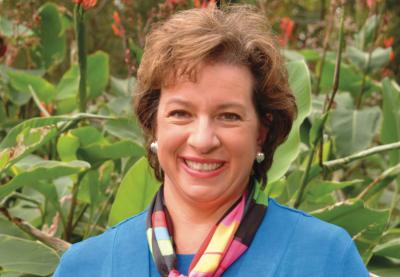Betsy Rogers is the National Teacher of the Year. She teaches elementary school in Leeds, Ala., near Birmingham, where she developed a looping class, staying with the same students for two years, from first through second grades.
A teacher for 22 years, Rogers earned her bachelor's degree in Elementary Education in 1974 at Samford University. More than 20 years later, she completed her master's and doctorate, also at Samford.
Sitting down with Teaching Tolerance, Rogers re-emphasized her commitment to equity in education and her belief that the best teachers should seek out the most difficult assignments.
Your 1st-grade teacher, Miss Britton, once said, "Children are like rosebuds; they do not all bloom at the same time, but the first bloom is just as pretty as the last." Why do her words stay with you after all these years?
We had huge classes at that time, and I wasn't in the top reading group. Reading at that age was a struggle for me. But once I (learned), it clicked. When I became a first-grade teacher, I really understood what she was saying. I was very conscious that children need time, that they don't all blossom at the same time. Having that background made me realize I couldn't have the same expectations for every child.
You have said you were at first overwhelmed by the poverty and neglect you encountered in some of your students. What have you learned about teaching such students?
I wanted to fix the world for those children. I was pretty naïve. I had to come to grips with it, that I had limits on what I could do. That was very hard. What I decided to do, I wanted my classroom to be a place where they felt safe, cared for, nurtured. I wanted it to be a beautiful place because I knew school was the best place some of my children ever got to go to. I wanted it to be exciting. I wanted it to be interesting, colorful. I wanted it to be a place that was going to be a good place all day.
This year marks the 50th anniversary of the Brown v. Board of Education decision. How far do you think we've come in the years since that ruling, and how far do we still have to go?
I was raised here in Birmingham, all the way through Birmingham public schools, and they were segregated until my junior year of high school. At that time, I didn't really think a lot about this. Then when I became an adult and had children of my own, it became very important for me to have children raised in a diverse population.
That's why my husband and I chose to move to Leeds. We liked the diversity; as a child I had known very little diversity. Leeds was a great population, very balanced. That's the kind of schools we should have, with that balance.
But it seems to me the same cycle repeats. We still see the white flight from inner cities. The city schools that once were predominantly white now are predominantly black. Unfortunately, in my travels across the state of Alabama, segregation is still alive.
The solution starts, as a parent, with your own children. As a teacher, I think when you make a step up, it shouldn't be to a more affluent school. The best teachers should go to the schools that need them most; that should be the step up, the reward. I wish we had that mindset.
This national honor takes you out of the classroom. How difficult is that? And do you plan to return to classroom teaching when this year is over?
I miss being with the children. My happiest days are the days I spend in school, the days I spend with children. But this is a great learning opportunity. I know I'll be a better teacher when I come back to the classroom, and I do plan to come back. That's what I am: I am a teacher. That's what I love. I love to work with children every day.
We started with Miss Britton. Let's end with you: What do you hope your students remember, forty-odd years from now, about Mrs. Rogers, their own 1st- and 2nd-grade teacher?
I hope they remember first of all that I cared about them, that their year was special. I tried every day to make something special. Every day I was trying to make a memory. I hope I gave them some memories, very good, happy memories about school. I hope I provided them the skills to be successful. And I hope they know I tried not to leave any stone unturned.
